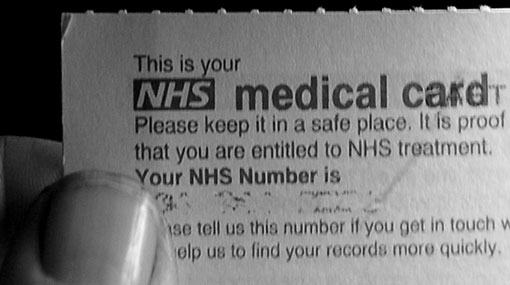feeling faint…haven’t…eaten in…many many…minutes…

Had my first experience of the NHS last week. I brought some blood pressure meds from the States, but I knew I’d have to dive into socialized medicine when that ran low.
I am happy to report that they did not lower my blood pressure by hacking off one of my limbs with a rusty circular saw. Staff was professional and polite; appointment was timely. In fact, my experience so far has been indistinguishable from America-with-corporate-health-insurance (including having to pony up a co-pay on my meds).
For the record, I believe the US had the most sensible public medical scheme in the world…thirty years ago. Do you remember what we did before the invention of the HMO? We paid for the small stuff ourselves, out of pocket, and bought relatively inexpensive catastrophic health insurance for in case we did something extravagant like step in front of a bus. Best cost/services trade off ever devised.
I voluntarily went back to that old system for a while, maybe fifteen years ago. Several big HMO’s in a row went bust on me and I got sick of changing doctors. So I said screw it, opted for the indemnity insurance with a high deductible, picked a doctor at random and paid for the routine stuff myself.
A typical office visit was $60. A tetanus shot was $35. A thorough blood workup: $110. At year’s end, I spent less on my health than on car maintenance. I stopped when I did the math and realized my employer was charging me more to do it this way. Bastards. Stupid, stupid bastards.
The idea behind the Health Maintenance Organization is that patients getting routine medical care should spend less on health care in the long run by catching small problems before they become big problems. But in the short run, such a scheme would obviously cost more. So the state was asked to subsidize HMOs at the start. Can you guess if those projected savings ever materialized?
And is the very HMO concept viable? It seems so logical that regular, routine care is a good idea that I was shocked to read Theodore Dalrymple (in a…book…the name of which I don’t recall…that is in a box somewhere) asserting that it is not. Medicine is not without risk: there are drug conflicts, doctor errors, hospital infections. Many conditions get better on their own. Some diseases are less dangerous than their cure (slow-advancing cancers in the very elderly, for example).
It’s a matter of absolute chance whether you’ll be the poor bastard who comes down with something that needs catching in the nick of time, or whether you’ll catch something that would have been better let alone.
I’m rambling. I’m sorry. I haven’t eaten anything in almost a hundred and thirty two minutes. I went to pains to have my annual blood work done before I left but it turns out, they use different measures here and I have to have it done again. Tomorrow. And it’s a fasting test.
Ummm…vodka isn’t food, right?
Posted: March 16th, 2009 under britain, medicine, personal.
Comments: 10
Comments
Comment from Mike
Time: March 16, 2009, 6:04 pm
I too am old enough to remember those halcyon days of yore. Funny how so much that’s wrong with the US these days can be traced right back to federal fingers where they have no constitutional business being…and, of course, Ted “Jabba the Senator” Kennedy.
Comment from Gnus
Time: March 16, 2009, 6:31 pm
Good times. Good times.
Comment from dfbaskwill
Time: March 16, 2009, 6:55 pm
Oh, I long for the great pay-as-you-go health care system of times of yore. My fees would be way lower, and my take would be higher. Alas, the government determines what I charge, what I receive and even to a large extent, what I do. And that’s for non-government health care plans. Medicare was the worst thing to ever happen to this country (prior to what they are up to next!) Keep us up to date about health care and its financing over there. And stay healthy.
Comment from Buffoon
Time: March 16, 2009, 6:57 pm
Vodka is not food until you put OJ in it, just tryin to help…
Comment from Allen
Time: March 16, 2009, 7:48 pm
Whoa! I just applied the same probability risk assesment on health care, that was used for establishing risk on synthetic mortgage backed securities…
Hey, I just came up with a new financial instrument. Body Part Debt Swaps (BPDS.) You lose a leg, no sweat. We’ve got it covered with an arm loss.
As long as arms and legs keep getting lost, the market will soar. I swear.
Comment from Gibby Haynes
Time: March 16, 2009, 8:26 pm
Vodka is made from grain, a food. Huzzah, huzzah.
Comment from Muslihoon
Time: March 16, 2009, 9:03 pm
Out of curiosity: how would an insulin-dependent diabetic fare under the old system? Did stuff cost less then?
Comment from Lokki
Time: March 17, 2009, 8:18 pm
Vodka belongs to one of the important food groups I learned about in college.
Alcohol, tobacco, grease, and dirt, in order of importance, if I remember correctly.
Comment from sfcmac
Time: March 21, 2009, 5:48 pm
“Ummm…vodka isn’t food, right?”
It’s liquid taters.











Write a comment
Beware: more than one link in a comment is apt to earn you a trip to the spam filter, where you will remain -- cold, frightened and alone -- until I remember to clean the trap. But, hey, without Akismet, we'd be up to our asses in...well, ass porn, mostly.<< carry me back to ol' virginny